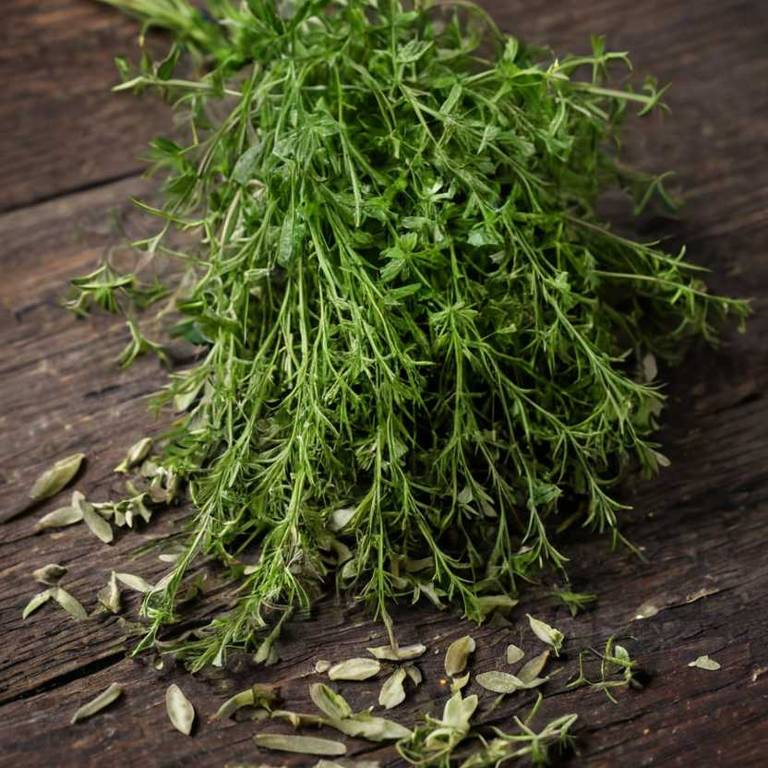By Leen Randell
Updated: Jul 07, 2024
What Are The Medicinal Properties Of Corchorus Olitorius (Jute)?

Corchorus olitorius, also known as jute, has health benefits such as reducing inflammation and improving digestion.
The herb is rich in mucilage, flavonoids, and alkaloids, which are responsible for its medicinal properties. Medicinal preparations of jute include teas, infusions, and decoctions, which can be used to treat various ailments. However, excessive consumption of jute may lead to gastrointestinal disturbances.
It is essential to consult a healthcare professional before using jute as a medicinal herb, especially for pregnant or breastfeeding women, and individuals with underlying medical conditions.
This article explains the health benefits, active constituents, medicinal preparations, possible side effects, and precautions related to Corchorus olitorius.
- What are the health benefits of Corchorus olitorius?
- What are the active constituents of Corchorus olitorius?
- What are the medicinal preparations of Corchorus olitorius?
- What are the possible side effect of using Corchorus olitorius improperly?
- What precautions to take when using Corchorus olitorius medicinally?
What are the health benefits of Corchorus olitorius?
Corchorus olitorius, also known as jute, has health benefits such as reducing inflammation and improving digestion due to its high fiber and mucilage content.
The mucilage in jute also soothes the digestive tract, alleviating symptoms of irritable bowel syndrome and other gastrointestinal issues.
Additionally, jute's antioxidants may help protect against cell damage and reduce oxidative stress, contributing to overall well-being.
Here's a detailed article about the 10 health benefits of Corchorus olitorius.
What are the active constituents of Corchorus olitorius?
Corchorus olitorius, also known as jute, has active constituents such as flavonoids, phenolic acids, and glycosides.
These compounds are believed to possess antioxidant, anti-inflammatory, and antimicrobial properties, which may contribute to the plant's traditional uses in folk medicine.
The flavonoids, specifically, are thought to have a potential role in treating cardiovascular diseases and may also exhibit immunomodulatory effects.
Here's a detailed article about the 10 active constituents of Corchorus olitorius.
What are the medicinal preparations of Corchorus olitorius?
Corchorus olitorius, also known as jute, has medicinal preparations such as infusion, decoction, and poultice.
The leaves are used to treat fever, diarrhea, and digestive issues. The plant's juice is used to treat skin conditions, eczema, and ulcers.
It is also used as a remedy for menstrual disorders and is believed to have anti-inflammatory and antiseptic properties.
Here's a detailed article about the 10 medicinal preparations of Corchorus olitorius.
What are the possible side effect of using Corchorus olitorius improperly?
Improper use of Corchorus olitorius, also known as jute, increases the chances of experiencing side effects such as gastrointestinal discomfort, nausea, and diarrhea.
Prolonged consumption can lead to kidney damage and liver dysfunction in some individuals. Additionally, allergic reactions to jute may cause skin irritation, itching, and respiratory issues in rare cases.
It is essential to consume jute in moderation and consult with a healthcare professional before using it for medicinal purposes.
Here's a detailed article about the 10 most common side effects of Corchorus olitorius.
What precautions to take when using Corchorus olitorius medicinally?
Before using Corchorus olitorius, also known as jute, for medicinal purposes, you must take precautions such as consulting a healthcare professional, especially if you have any underlying health conditions.
Be cautious of allergic reactions, and avoid consuming it in excess, as it may cause gastrointestinal upset or interact with certain medications.
Freshness and proper storage are also crucial to prevent contamination and ensure potency.
Here's a detailed article about 10 precautions to take when using Corchorus olitorius.